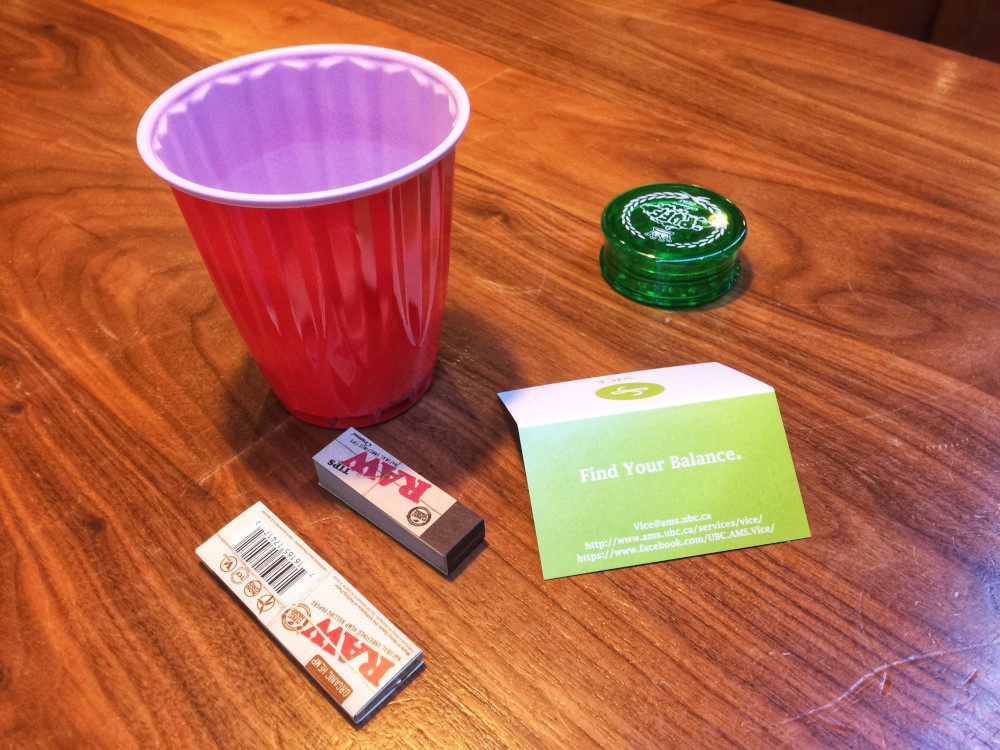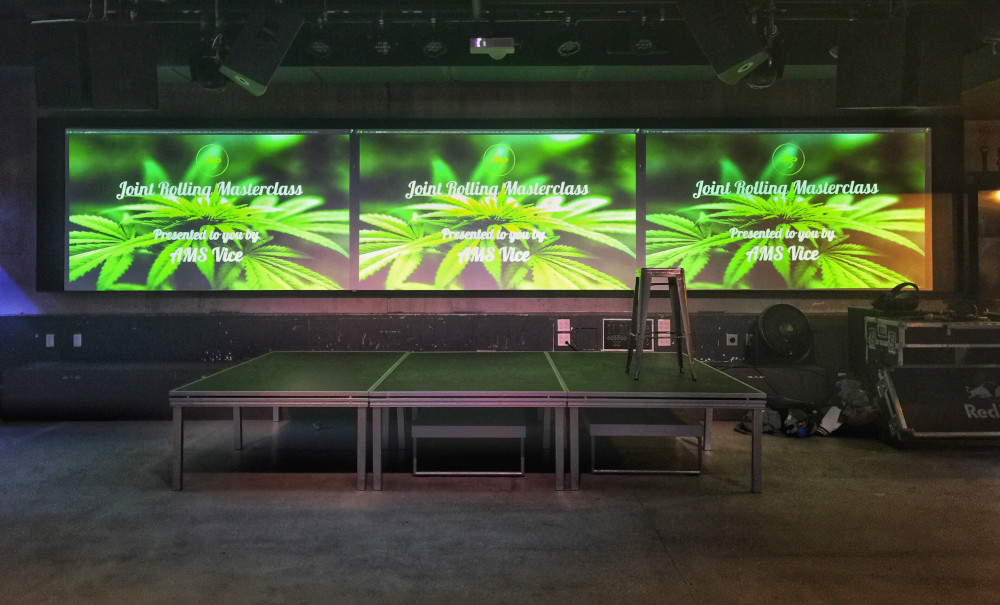On a Tuesday night, students filtered into a UBC pub prepared for a different scene than the usual campus club nights. The bar was closed, the dance floor deserted, and every table pre-set with rolling papers, a grinder and cooking herbs in a red Solo cup. The room glowed green, reflecting cannabis-adorned presentation screens announcing the “Joint Rolling Masterclass.”
At 6:30 p.m., a lanky student volunteer bounced onto the stage TED Talk-style. He welcomed the crowd briefly before diving into a multi-slide presentation on “weed basics.”
The class is the first of its kind at UBC, hosted by AMS Vice. Vice is a student-run organization that aims to “help students find their balance with drugs, alcohol, and tech” with hands-on workshops and peer group sessions.
The group discussed “common myths” like whether cannabis causes cancer (not definitively) and the differences between sativa and indica strains (head-high versus body-high, but different from person to person). When you mix alcohol and marijuana, it’s called “cross-fading” and will intensify your high for better or for worse (probably the latter). The speaker urged the crowd more than once not to drive while stoned, and to check with a pharmacist before mixing pot and prescriptions.
Crowd participation was encouraged. “How many of you have had a bad trip?” a volunteer asked the group, describing the unpleasant sensation of “greening out” when you’ve taken too much.
A girl with a ponytail raised her hand and described her first experience getting too high. “I started to get really paranoid. I remember freaking out, because I thought I was going to be high forever,” she said. “I was in the worst place possible, a crowded place downtown.”
The audience groaned in collective understanding, and the volunteer recognized the teachable moment. “It’s always better to do it in places you’re comfortable in,” she said sagely, and suggested remedies like taking a nap, having a snack or using CBD oil to counteract the THC levels in the cannabis.
The information session lasted 30 minutes. Then, with the help of a slideshow breaking the process into seven steps, attendees practiced rolling joints while volunteers hovered, ready with encouraging words.

AMS Vice celebrated its two-year anniversary at UBC last January. Its programming includes four to five workshops every year that aim to educate students on the safe use of substances.
According to Piers Fleming of AMS Student Services, the group’s events are chosen around what’s in the news. This year, hot topics included marijuana legalization and Vancouver’s ongoing overdose crisis.
Vice’s most popular programming this school year has been naloxone training, and the last two sessions have had a waiting list. At a mid-March event, students were taught by a panel of experts on identifying an overdose and treating one with naloxone. Each student received a naloxone kit to keep.
“[The students] were very enthusiastic to learn,” said Garth Mullins, an activist and instructor at the event. “People really wanted to leave with that skill set, to be able to protect their neighbours and friends.”
Mullins said that Vice’s focus on harm reduction and its method of active participation sets UBC apart from other colleges and workplaces.
“Some institutions have been kind of reticent to have this kind of training,” he said, because administrations are either worried about liability or believe the crisis won’t affect their students and staff. “The extent that Vice was like, ‘Yes, let’s do this,’ that’s good.”
The challenge lies in adapting real-world training to a school environment. At the overdose training, students pierced oranges with water-loaded syringes to simulate needle and muscle. At the marijuana workshop, students rolled dried oregano and basil into what one attendee called “Olive Garden joints.”
This year, in addition to workshops, Vice has started offering peer mentoring services to students struggling with dependency on anything that threatens a balanced, healthy lifestyle.
“We’ve had interest from students saying they’re addicted to social media, or video games,” said Fleming. “It’s not necessarily just substances.”
Students struggling with balance are paired with Vice volunteers, many of whom Fleming said are nursing or pharmacy students, who act “not like a counselling service” but rather as a supportive figure and a wealth of resources.
“Vice is unique, because it’s a service on campus that’s not advocating against drug use,” Fleming said. “It’s realistic in that it knows that students are going to be taking drugs. We’re not about making students party less; we’re just making sure that they do it in a safe way.”
At the joint-rolling workshop, volunteers helped stuff filters into the clumsily packed first attempts while attendees asked questions like where to buy marijuana safely and cheaply. One woman asked if Vice is planning any workshops on psychedelics.
“I think we did pretty well, for a first time,” said a girl in gold-rimmed glasses, lifting her faux-joint to the light.
“Yours looks beautiful,” agreed her friend, before they rose to leave. “I’m heading back to the library now, if you want to come.”
Across the room, the girl with the ponytail admired her handiwork.
“Cancer-curer by day, joint-roller by night!” she declared. ![]()

















Tyee Commenting Guidelines
Comments that violate guidelines risk being deleted, and violations may result in a temporary or permanent user ban. Maintain the spirit of good conversation to stay in the discussion.
*Please note The Tyee is not a forum for spreading misinformation about COVID-19, denying its existence or minimizing its risk to public health.
Do:
Do not: